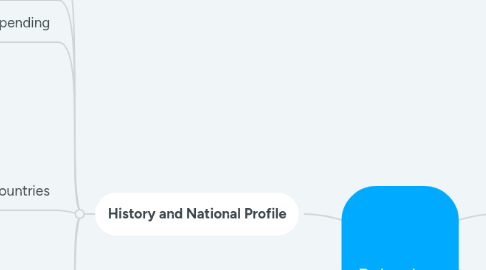
1. History and National Profile
1.1. Historical Background
1.2. Colonial History
1.3. Military Involvements and Military Spending
1.3.1. Approx. PLN 113 billion in 2024, inc. 16.3% from 2023
1.4. Relations with Neighbouring Countries
1.4.1. Belarus:
1.4.2. Czechia
1.4.3. Germany
1.4.4. Lithuania
1.4.5. Russia
1.4.6. Slovakia
1.4.7. Ukraine
1.5. Figures about the Population
1.5.1. 312 679 km2 / 38 million people
1.6. Geographical Overview
1.6.1. -Located in Central Europe and borders with Germany, Czechia, Slovakia, Ukraine, Belarus, and Russia (the Kaliningrad exclave). -Northern border runs along the Baltic Sea coast. -Central European time zone (GMT +1 hour / UTC + 1 hour) -Capital: Warsaw -Other cities: Lodz, Krakow, Wroclaw, Poznan, Gdansk -Natural resources: Coal, copper, sulfur, natural gas, silver, lead, salt
2. Economy
2.1. Major Industries and Exports
2.1.1. Agriculture
2.1.1.1. 2nd largest potato production and is the 6th largest producer of milk and pigs
2.1.2. Energy
2.1.3. Manufacturing
2.1.4. Tourism
2.1.5. Main Exports: Machinery, metals, minerals and fuels, chemicals, agricultural products
2.2. Type and Size of Economy
2.2.1. Mixed Economy
2.2.2. $845 billion (nominal, 2024) $1.801 trillion (PPP, 2024)
2.3. GDP and Economic Growth
2.3.1. 2.9% growth in 2024, from 2.7% growth in September 2023
2.4. Employment and Unemployment Rates
2.4.1. Employment rate: 72.30% in first quarter of 2024. Record high in fourth quarter of 2023 (72.70%)
2.4.2. Unemployment rate: -2023: 5.1%, -2024: 5% (second in the EU with the lowest unemployment rate)
2.5. Development Data/UN Human Development Index
2.5.1. 0.876 points in 2021, 0.881 points in 2022
2.5.2. 0.876 points in 2021, 0.881 points in 2022
2.6. Types of Energy Used for Power/Electricity
2.6.1. Wind: 22.12 TWh ( inc. 20.18%)
2.6.2. Solar: 13.22 TWh.
2.6.3. Biomass: 2.12 TWh.
2.6.4. Hydropower: 1.81 TWh.
2.6.5. Hard-coal: 76.61 TWh (dec. 12.71%)
2.6.6. Lignite: 34.57 TWh (dec. 26.41%)
2.6.7. Gas: 13.65 TWh (inc. 36.48%)
2.6.8. Oil: 2.54 TWh
2.6.9. Hydropower: 1.81 TWh.
2.7. Trade Agreements and Partners
2.7.1. Europe Agreement with the EU and free trade agreements with the European Free Trade Area (EFTA) countries, the Central European Free Trade Agreement (CEFTA) countries, the Baltic states, Israel and Turkey
2.7.2. Main export partners: Germany, France, the United Kingdom, the Czech Republic, Italy, Russia
3. Culture
3.1. Languages spoken
3.1.1. Polish (97%-98%)
3.1.2. Silesian, Kashubian, English, German
3.2. Ethnicities
3.2.1. Poles (97%)
3.2.2. Silesians (1.1%)
3.2.3. German (0.2%)
3.2.4. Unspecified (1.7%)
3.3. Religions
3.3.1. Christianity (Catholicism) (72%)
3.3.2. Islam (0.01%)
3.3.3. Buddhism (0.01%)
3.3.4. No religion (6%)
3.3.5. Undeclared (20.57%)
3.4. Traditions and Customs
3.4.1. Drowning of Marzanna on the first day of spring (Symbolises the end of winter)
3.4.2. Kanapki (open sandwiches)
3.5. National Holidays
3.5.1. 2 May: Day of the Flag
3.5.2. 3 May: Constitution Day
3.5.3. 2 Nov: Zaduski (All Souls Day)
3.5.4. 11 Nov: Independence Day
3.6. Cuisine
3.6.1. Duck soup (czarnina)
3.6.2. Red beet soup (barszcz)
3.6.3. Grzybowa (traditional soup with cabbage and mushrooms)
3.7. Arts and LIterature
3.7.1. Classical music festivals: Frederick Chopin, Beethoven (in Krakow), Mozart (in Warsaw)
3.7.2. Polish poets: Adam Mickiewicz, Juliusz Słowacki, and Zygmunt Krasiński
3.7.3. Polish writers: Bolesław Prus, Eliza Orzeszkowa, Stefan Żeromski.
3.7.4. Polish writers who won the Nobel Prize: Henryk Sienkiewicz (1905) and Władysław Reymont (1924)
3.7.5. Polish music: krakowiak, mazurka, and polonaise
3.7.6. Marienburg, once the headquarters of the Teutonic Knights (named a World Heritage site by UNESCO)
4. Political Situation
4.1. Type of government
4.1.1. Semi-presidential republic
4.2. Current Political Leaders
4.2.1. President: Andrzej Duda
4.2.1.1. Since 2015
4.2.1.2. Political party: -Independent (2015–present) Other political affiliations: -Law and Justice (2005–2015) -Freedom Union (2000–2001)
4.2.1.3. Head of state, supreme commander of Armed Forces, supreme representative of Poland
4.2.2. Prime Minister: Donald Tusk
4.2.2.1. Since 2023
4.2.2.2. Member of Civic Platform (PO) which is part of Civic Coalition (KO)
4.3. Major Political Parties
4.3.1. Law and Justice (PiS)
4.3.1.1. Head: Jarosław Kaczyński
4.3.1.2. Ideology: -National conservatism -Right-wing populism -Soft Euroscepticism
4.3.1.3. Provides welfare programs and minimum wage hikes
4.3.1.4. Supports Ukraine in Russia-Ukraine war
4.3.1.5. Opposes EU Pact on Migration and Asylum
4.3.1.6. Accused of: -undermining democratic rules -reshaping the country according to conservative values -politicising judiciary: staffing top courts with judges sympathetic to the ruling party
4.3.2. Civic Coalition (KO)
4.3.2.1. Head: Donald Tusk
4.3.2.2. Other leaders: -Rafał Trzaskowski -Adam Szłapka -Barbara Nowacka -Urszula Zielińska
4.3.2.3. Ideology: -Liberalism -Liberal conservatism -Pro-Europeanism -Anti-immigration
4.3.2.4. Wants to dismantle PiS's judicial reforms to free up billions of euros in EU recovery funds
4.3.2.5. Media freedom
4.3.2.6. Loosen abortion laws
4.3.2.7. Failed to boost employment and wages, rise in the retirement age
4.3.3. The Third Way
4.3.3.1. Simplifying the tax system
4.3.3.2. Increasing education spending
4.3.3.2.1. Measures to help small businesses
4.3.4. The New Left
4.3.4.1. Labor law reforms
4.3.4.2. Women's rights
4.4. Government Policies
4.5. Human Rights Issues
4.5.1. Judicial Independence
4.5.2. Right to healthy environment
4.5.3. Right to privacy
4.5.3.1. Unauthorised surveillance on opposition figures and critics
4.5.4. Right to education
4.5.4.1. Access to education for refugees (200,000 Ukrainian refugees no education)
4.5.5. Abortion rights
4.5.5.1. Denied even under lethal conditions
4.5.6. Refugees’ and migrants’ rights
4.5.6.1. Denied international protection by border guards (55 migrants and asylum seekers died under such conditions)
4.6. International Relations and Alliances
4.6.1. EU, UN, NATO, IMF, The Schengen Area, Visegrád Group, CoE, EEA, OECD, OSCE
4.6.2. Fiji: Diplomatic relations were established on 11 July 2014.
4.6.3. Cyprus: Diplomatic relations were established during the 1960s
4.6.4. Serbia: Diplomatic relations have been maintained since Poland and the Kingdom of Serbs, Croats and Slovenes established them in 1919. Allies in WW1, donated vaccines to Serbia in 2021, terrorist threats sent to Serbia in 2022
4.6.5. Uzbekistan: Good relations, based on growing trade, and political and educational cooperation, Uzbekistan helped Poland evacuate from Afghanistan in 2021, donated vaccines to Uzbekistan in 2021
